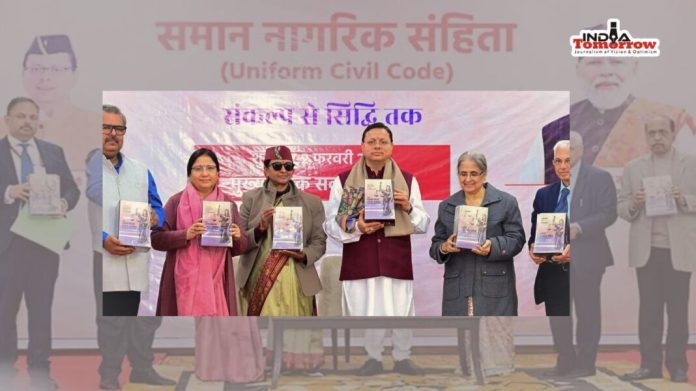Dehradun: July 14‘ 2024: The long-awaited Uniform Civil Code (UCC), a key promise of the ‘Sangh Parivar,’ is set to be implemented in Uttarakhand by October 2024, as announced by Chief Minister Pushkar Singh Dhami. The UCC aims to standardize laws regarding marriage, divorce, succession, and live-in relationships, purportedly to promote equality and justice in society.
However, the UCC has sparked controversy due to its exclusion of the state’s tribal population. According to the Act, “Nothing contained in this code shall apply to the members of any Scheduled Tribe within the meaning of clause (25) of Article 366 read with Article 342 of the Constitution of India and the persons and group of persons whose customary rights are protected under part XXI of the Constitution of India.”
The full report on the UCC, passed by the Uttarakhand state assembly in February this year, was recently made public by Shatrughan Singh, a former Chief Secretary of the state and member of the Rules Drafting and Implementation committee of the UCC. Singh, along with a five-member committee headed by former Supreme Court Judge Ranjana Desai, prepared the report, which is now available online at https://ucc.uk.gov.in.
The committee, established on May 27, 2022, conducted 43 public hearings and received input from 2.33 lakh people before submitting its report to the state government on February 2, 2024. The report was subsequently tabled in the state assembly, passed, and received Presidential assent.
While some sections of the UCC were initially withheld due to the imposition of a model code of conduct for the Lok Sabha elections, the entire UCC has now been made public. However, the exclusion of tribal members from the UCC has raised questions. Shatrughan Singh noted that while the Constitution provides strong special provisions for tribals, minorities have religious protections under Articles 25 and 26. He did not provide a rationale for including Muslims but excluding tribals from the UCC.
The UCC mandates the registration of marriages, divorces, and live-in relationships, with penalties for non-compliance. This requirement applies if one of the persons involved is a resident of Uttarakhand.
Critics argue that the UCC targets minorities, particularly Muslims, by imposing restrictions on practices such as multiple marriages and the traditional ‘Iddat’ period following divorce or a husband’s death. The UCC sets the marriage age at 18 for women and 21 for men, which aligns with Hindu laws but differs from the Muslim practice where puberty, typically above 15 years, determines the marriage age for girls.
The UCC’s provisions on marriage, divorce, and inheritance conflict with existing personal laws for Hindus, Muslims, Christians, and Jews, which are already governed by central legislation. This overlap has led to concerns that the UCC primarily aims to undermine minority rights.




